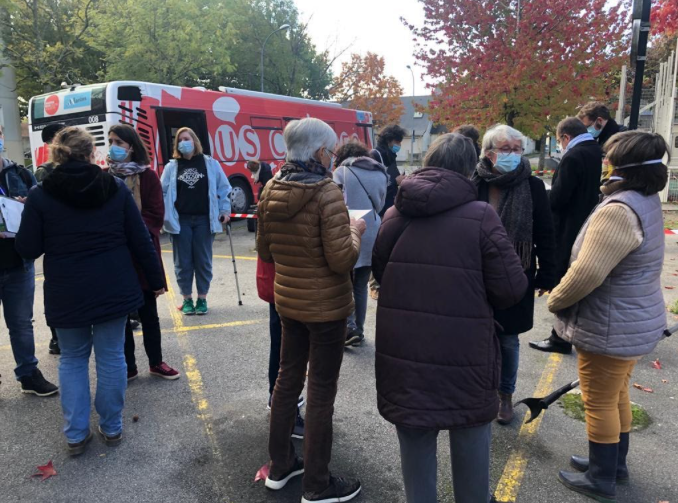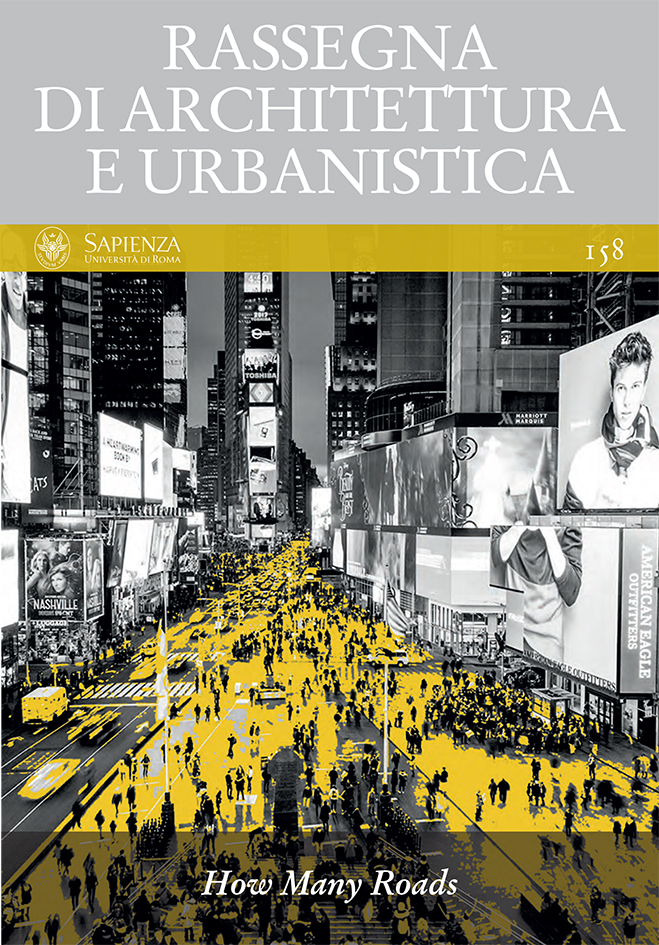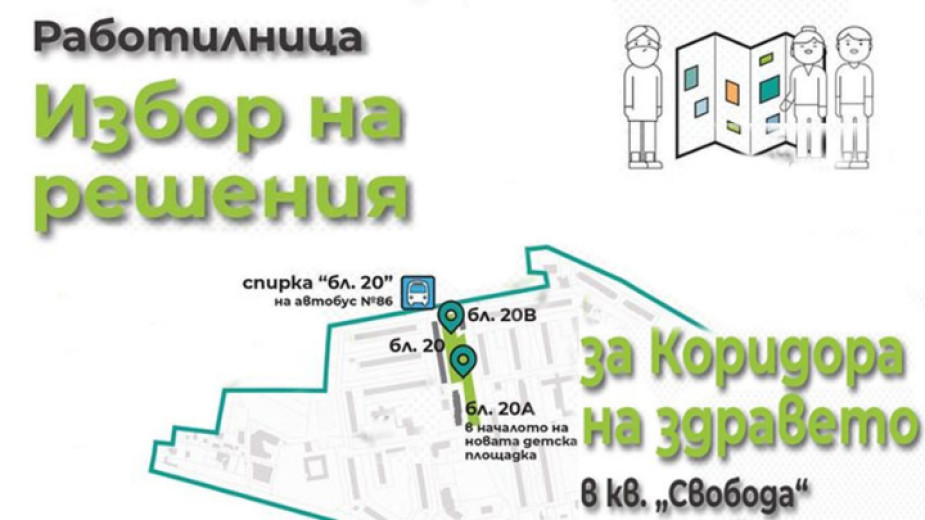URBiNAT cities through the lens of the COVID-19 pandemic
As COVID-19 tore across Europe and the world it struck at the heart of our societies, taking lives and revealing in a harsher, more uncompromising light the extent of social, economic and environmental disparities within our communities. The pandemic spread indiscriminately. Yet, it is clear that factors such as income level, housing type, neighbourhood, and other socioeconomic variables would (once again..) determine starkly different levels of exposure or risk. Individuals, families and communities have not suffered the effects of the pandemic in the same way. But what does this really mean? How have people coped with the restrictions imposed by COVID-19 mitigation policies? What lessons can we draw from this period?
The seven URBiNAT cities – Sofia, Nantes, Porto, Brussels, Siena, Høje-Taastrup and Nova Gorica – shared their views on the repercussions, challenges, responses and alternatives that emerged with the pandemic. In this series of seven posts, we share the main measures implemented by local municipalities, and some stories to inspire alternative and cooperative ways to live together (in) the city.
Click HERE for the other articles in this series.
The full version will be available in URBiNAT’s deliverable related to the compilation and analysis of human rights and gender issues to be released in 2021. Available in the RESOURCES section of the website.
Nantes (France)
Julie Boulestreau, Charlotte Cardinal and Nathalie Roguez-Villette, from the Municipality of Nantes and Nantes Métropole, shared some of the challenges faced by the residents of Nantes Nord, the URBiNAT intervention area, and how they coped during this period. They also shared some lessons learnt and ideas for the future.
The pandemic crisis, and the lockdowns that were imposed in the spring and late autumn of 2020 exacerbated existing difficulties and increased the vulnerability of certain sections of the population. Across Nantes, an unprecedented number of people faced a food emergency as families’ financial situations deteriorated due to job loss, lay-offs and unemployment. The digital divide became particularly apparent among families with school children who were required to home school. Added to this was the psychological distress felt by many due to the disruption of mental health care services, and pandemic-related anxiety.
The Municipality of Nantes set up some projects and campaigns to respond to these challenges. It worked in close proximity with local inhabitants and associations, sought inspiration from other projects and, importantly, tried to undertake all actions to support populations in most need in a spirit of dignity, humanity and respect for the people, without judgments of any kind.
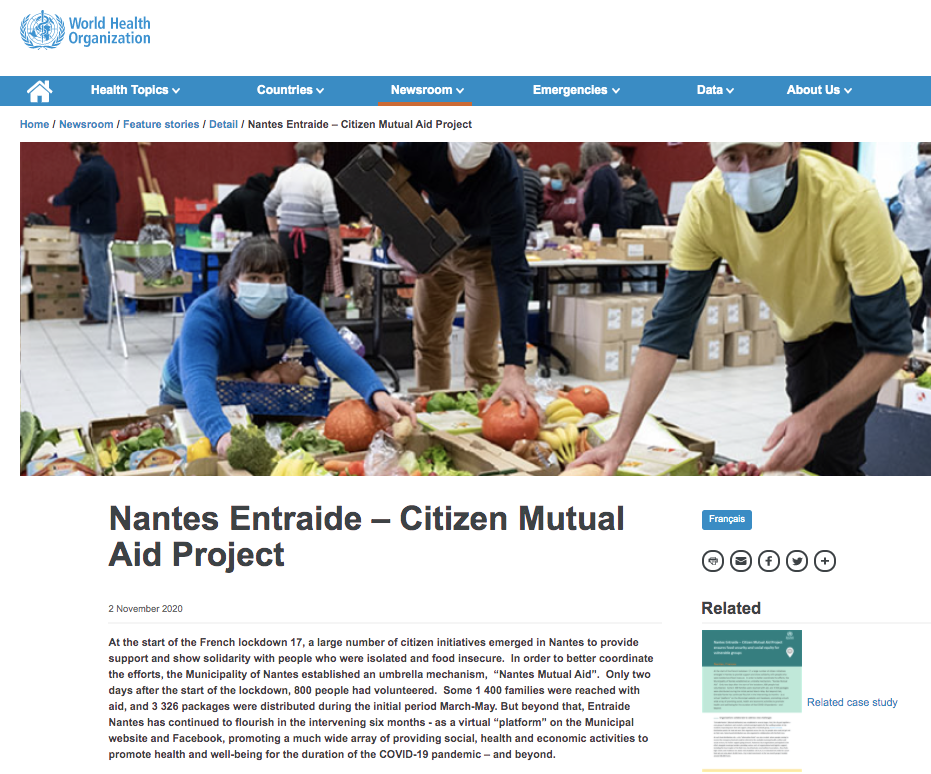
The Nantes Entraide initiative was highlighted as a case study on the website of the World Health Organization. Source: https://www.who.int/news-room/feature-stories/detail/nantes-entraide-citizen-mutual-aid-project
To cope with situations of food emergency, the Municipality created informal spaces to dispense food according to different dietary needs and traditions. These were set up to resemble regular shops.
Until the end of September 2020, volunteers managed the distribution of around 100 food packages per week to families in Nantes Nord. A partnership with the social services of the University of Nantes, the student centre and a local association allowed setting a specific food service for students from the campus situated in Nantes Nord. The “solidarity gardens”, an initiative developed by the Municipality before the pandemic, were reinforced. Besides providing fresh vegetables, this space also helps in the development of activities about food and nutrition.
Bridging the digital divide is a priority for the Municipality of Nantes. As such, the Municipality and Nantes Métropole are working together to mobilize IT companies in the reconditioning of equipment, and the provision of classes. People can also use the Médiathèque (media library) in Nantes Nord to access the internet. But the Municipality is still looking for inspirational examples aiming at providing wider and cheaper internet access.
In response to psychological distress felt by many, the Municipality highlights three important local interventions in Nantes Nord. The LE PAS association together with the Municipality offered support in a variety of ways, in particular to adults in socially underserved neighbourhoods. The Les Forges Médiation association provided health mediation under an agreement with the Municipality and linked to the municipal Multidisciplinary Health House project in Nantes Nord. Finally, housing association/social landlord and social workers undertook collective social monitoring, maintaining a regular link with inhabitants.
The participation and involvement of citizens and associations were central to cope with challenges imposed by the pandemic, especially during the two lockdown periods.
In both periods, the Municipality maintained the Nantes Entraide, aiming at supporting and organizing solidarity among residents. The work by other associations, such as hip hop and youth associations, whose members took an active role in proposing actions and taking a seat in the collective arena to enable faster collective initiatives to take place, was also vital. Local initiatives that were created during the health crisis continue to help, forge links and foster solidarity with the most vulnerable. The Solidarité Nantes Facebook page is a space where plans, advice, recipes and know-how are shared. It also allows making appointments to deal with stocks of perishables or exchange administrative and legal advice.
All these interventions make up an important network with which to identify needs and provide information. But the current situation in France is still very demanding, with several constraints and limits imposed on individual freedoms – a state of ‘permanent semi-liberty’. Physical and social distancing impacts the health and quality of life for all, particularly in terms of the loss of a balanced daily life and the breaking of human bonds, as is the difficulty in making plans and envisioning the future.
Looking to the future, we’ve learnt how important it is to reconsider the way of living and thinking about the city, and how the public sector was able to respond to this crisis. A new administration has just started at the Municipality and intends to reorganise and strengthen levels of proximity and to promote public innovation. An innovation week was a first initiative, allowing sharing and learning. Taking a step aside (un pas de côté) and “out of the box”, helps us to evolve in our ways of doing and thinking.
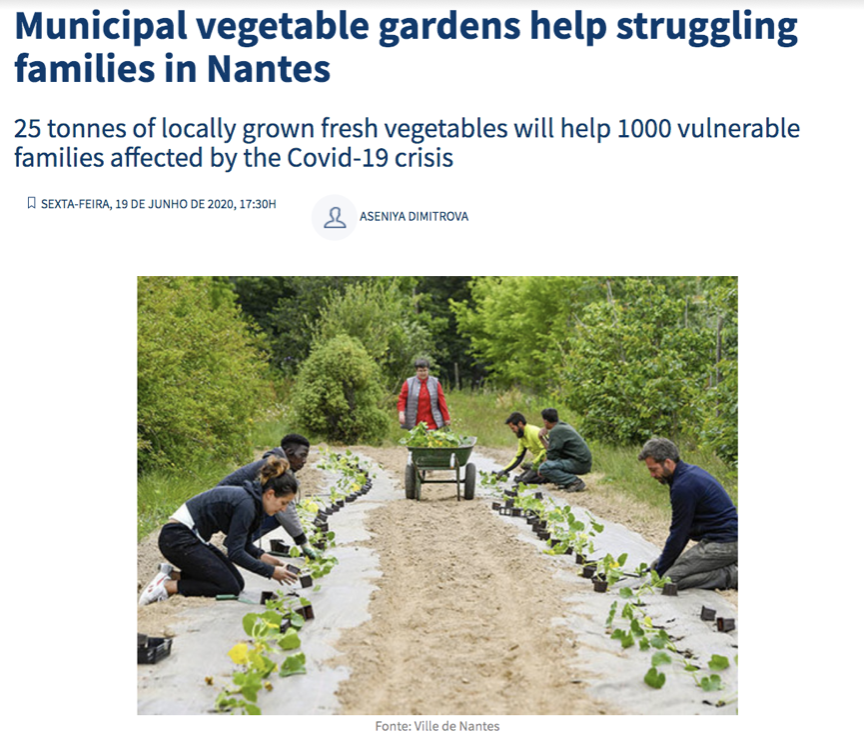
“Solidarity gardens” in Nantes. Source: TheMayor.eu - https://www.themayor.eu/en/a/view/municipal-vegetable-gardens-help-struggling-families-in-nantes-5197
This blogpost was elaborated by Rita Campos (CES-UC), based on the interview of Julie Boulestreau, Charlotte Cardinal and Nathalie Roguez-Villette (Municipality of Nantes and Nantes Métropole) conducted by Nathalie Nunes ( CES-UC), in the frame of task 1.5 (inclusion of cross-cutting dimensions human rights and gender) and its corresponding deliverable D1.8 (compilation and analysis of human rights and gender issues) to be released in 2021. The text was reviewed by Tom Mackenzie (ITEMS).
Comments welcome!
Do you live or work in Nantes? We would love to hear from you!
Did you feel the challenges described above? What lessons did you learn? What would you like to add to this picture?
Do you live or work in another city? We would love to hear from you also! How would you describe the challenges and opportunities that emerged with the pandemic in your city? Were/Are they similar to those in Nantes?


